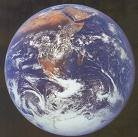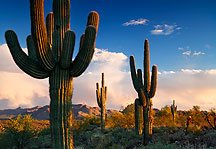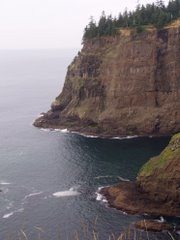 Despite an era of goofy politics in which environmentalists have been both crucified and demonized for speaking their minds --- all while unselfishly trying to help everyone except themselves --- interestingly enough, we've seen an undertow in the same era of unprecedented progress, environmental awareness, and a national mood forming into a greater world view on the environment and its fragility.
Despite an era of goofy politics in which environmentalists have been both crucified and demonized for speaking their minds --- all while unselfishly trying to help everyone except themselves --- interestingly enough, we've seen an undertow in the same era of unprecedented progress, environmental awareness, and a national mood forming into a greater world view on the environment and its fragility. It's that old cliche; the stormy dark night before the dawn...or the tasty plate of scrambled eggs, and then you bite into eggshell...or like that first sip of a hot cup of coffee, just to find out it brewed too weak...okay, shut up! You know what I mean.
Fortunately, the vision of non-profits and selfless, dedicated work of countless individuals has produced too many successful advancements in the environmental universe to mention...such as the awareness of global warming and effects of climate change...the advancements of LEED standards and green building implementation...the expansion of recycling effectiveness...New Urbanism bringing us closer to our workplaces and getting us out of our cars....and when we do need to drive, the ability to jump into a hybrid.
However we MUST do more...we must bring these strengths to the forefront and enter a partnership with the rest of the world...and in the process address the larger picture of greenhouse gas emissions and the world's energy future.
That starts by becoming part of the solution, not part of the problem...and of course that means to Help Obama! become the next President.
Anyway, my return from three weeks in Peru in the last few days has me thinking about how important America's example is for the rest of the world to follow, especially in the Americas.
 Sadly, Peru is so far behind us on their environmental awareness it's hard to know where to start. The poverty in that beautiful nation - beautiful for its people, its land, and its heritage - is beyond staggering. Everyone is focused on feeding themselves, or in the case of the minority rich, maintaining their wealth...but that's a SMALL minority. Most people there live in poverty and struggle every day to feed themselves and their families. Simply put, ECONOMICS DRIVES EVERYTHING in Peru.
Sadly, Peru is so far behind us on their environmental awareness it's hard to know where to start. The poverty in that beautiful nation - beautiful for its people, its land, and its heritage - is beyond staggering. Everyone is focused on feeding themselves, or in the case of the minority rich, maintaining their wealth...but that's a SMALL minority. Most people there live in poverty and struggle every day to feed themselves and their families. Simply put, ECONOMICS DRIVES EVERYTHING in Peru.Which brings back the question that every environmentalist hides under their jacket from...the ages old argument that, in my experience, has tied up every single tongue I've seen it presented to, without a single exception: if you're worried about feeding your mouth, how are you supposed to worry about the environment?
Uhhhhh...wellllllll...ummmmmmm...okaaaaaaay... Huh.
Let me know if you have an answer.
The problem is that we need to start finding solutions fast...because even if America had an impeccable record on the environment (which it doesn't), there's still the issue of the rest of the world outside of Europe, and how to bring them along.
Heck, it's difficult in Peru to find a garbage can for proper disposal of waste, let alone start pontificating on environmental standards...that is, if you could ever work with local or national officials to begin with, who are part of a corrupt, broken system of government and put in office by special interests...not to mention that you're seen as the Gringo barking orders to a Latin American country on how they should live their lives in an environmentally responsible manner.
Uh, good luck with that. Get back to me if you figure something out.
If anything's to ever be done in which some sort of tangible result would be detected, it would probably need to start with some international standards being set for vehicle and power plant emissions and the related technologies. Then there's the whole funding, education, and enforcement end of it.
Still, despite nonexistent emission standards on vehicles in Peru and resulting dirty smoke in the city streets; despite the piles of garbage in rivers and washes along the poverty-striken countryside; despite the unplanned growth creeping up the slopes of volcanoes in places like Arequipa, just waiting to be obliterated from the map in the next eruption; despite the restaurant owners carelessly throwing bleach water into the streets which will inevitably find its way into the water system...there's signs of hope.
It came primarily in the way that individuals, in the
 most humble of lifestyles and situations, were embracing solar technology. It was utilized for the heating of water systems on the rooftops of some of the hostels and hotels I stayed in...which was nice, because that guaranteed the event of a hot shower, let alone the power that was saved.
most humble of lifestyles and situations, were embracing solar technology. It was utilized for the heating of water systems on the rooftops of some of the hostels and hotels I stayed in...which was nice, because that guaranteed the event of a hot shower, let alone the power that was saved.The most striking example, however, came at the floating islands outside of Puno on Lake Titicaca, the highest navigable lake in the world (resting at a staggering 13,000 feet). Folks on these floating islands, in their modest lifestyle, utilize the reed to its fullest. It shelters their heads, cooks their food, builds them boats, and gives them land to walk on. It's the backbone to their lives.
 ...and through this lifestyle, which seems so primitive and salt-of-the-Earth (or salt-of-the-Lake) to our eyes, what did I see?
...and through this lifestyle, which seems so primitive and salt-of-the-Earth (or salt-of-the-Lake) to our eyes, what did I see?Solar panels.
As the picture here indicates, this was their primary source of electricity. It gives them lights at night, and allows them to power minor gadgets and devices. I was beyond impressed.
So there's glimmers of hope out there, even in countries that generally present the most backwards of mindsets on the environment...but that can change...and we can get more solar panels up and running in other parts of Peru...if we only show some backbone and strive to emerge as an international leader on the environment.
It's all about the process of building a more perfect union...and our progress on national and international environmental standards is no exception. If we can't set an example for our neighbors, then who will? S
















No comments:
Post a Comment